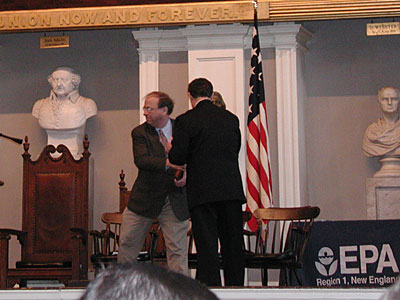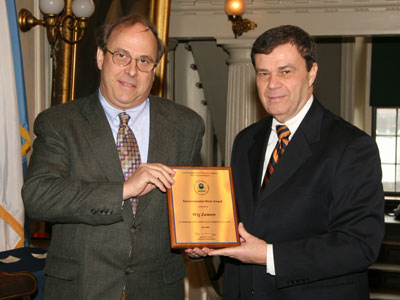
This year STEP nominated Wig Zamore for the New England EPA Environmental Merit Award and we are very proud to announce that he has been selected by EPA for this award for his tireless efforts to improve air quality in our community.
This award has been given for more than thirty years by EPA New England to honor people for their contributions on behalf of our region’s environment. âEPA’s Environmental Merit Award program has honored teachers, citizen activists, business leaders, scientists, public officials and others who have made outstanding contributions on behalf of our region’s public health and our natural environment.â (EPA website).
EPA will be making a formal announcement of award winners. There will be an event at Fanueil Hall on April 18th from 10 AM to Noon. We will also recognize Wig at the April 23rd STEP meeting.


Here is an excerpt of the nomination:
2007 Annual Environmental Merit Award Nomination for Wigton Zamore
Environmental Problems: The city of Somerville is a designated environmental justice community. It’s high percentage of low income, minority and immigrant residents are exposed to mobile sources of pollution caused by over 300,000 vehicles per day on 1-93 and local arterial highways and 200 diesel commuter trains passing through Somerville every weekday â conditions that have contributed to the fact that Somerville leads the state’s 351 cities and towns with excess lung cancer and heart attack deaths per square mile per year that are not attributable to smoking.
Efforts taken to address our environmental problems: The Somerville Transportation Equity Partnership (STEP) has been doing grassroots organizing to promote transportation equity and environmental justice for our city, in particular advocating for the state to honor the Ozone State Improvement Plan (SIP) commitment to extend the Green Line through Somerville. Through our efforts we have increased policy-maker awareness about the city’s environmental burdens and have been successful in seeing the state of Massachusetts finally honor its Ozone State Implementation Plan (SIP) commitment to extend the Green Line light rail system through Somerville that was promised in 1991.
Wig Zamore, a founding member of STEP and of the Mystic View Task Force (MVTF) has, over the last ten years become a lay expert on mobile sources of pollution and has educated STEP members and developed educational outreach material on the health impacts of mobile sources of pollution that STEP has used to inform and educate Somerville residents about the dangers of mobile sources of pollution on people living next to these sources. Through his work with MVTF he has negotiated with the developers to reduce from 100,000 to 50,000 additional vehicles going to the re-developed Assembly Square Mall.
Measurable public health and environmental benefits: With STEP, Wig has played a major role in securing the Green Line (light rail) in Somerville which will reduce the number of auto and bus trips in the city, thus cutting down on mobile sources of pollution. He has advocated for this project with elected officials, the Executive Office of Transportation, the MBTA and the Executive Office of Environmental Affairs. His efforts for MVTF have been critical to not only reducing the number of cars permitted at the Assembly Square Mall, but he has lead the effort to secure $15 million in funding from the developers and IKEA to build an Orange Line station at Assembly Square that will make the mall accessible by public transportation. He has also secured agreement from the developers for funding of an air quality study that will examine the impact of pollution on residents in close proximity to the Mall, I-93 and Route 28 and look at ways to mitigate the effects for these residents.
In February 2006, Wig Zamore was among eight people from across the country selected to speak at a meeting of the Environmental Protection Agency’s Clean Air Scientific Advisory Committee. Afterward, the panel agreed to clarify and stress the seriousness of its prior recommendation to EPA Administer Johnson calling for stricter annual average fine particulate matter standards. (EPA proposed an unchanged annual standard on December 21st despite overwhelming scientific evidence of significant harm to human health at the exposure levels allowed currently.) STEP participated in an air quality study in 2004 with members providing sampling assistance in a study conducted by Jonathan Levy and others researchers from the Harvard School of Public Health who were examining air quality impacts related to road closures during the Democratic National Convention in Boston.
Collaboration with others: Wig initiated and played a leading role in developing a research study proposal being submitted to NIH with the Tufts University Community Research Program to study the health effects of mobile sources of pollution on near roadway residents (Community Assessment of Freeway Exposures and Health Study).
In 2006 with the Metropolitan Area Planning Council (MAPC), Wig organized a meeting bringing together researchers from Harvard School of Public Health, Tufts University School of Medicine and MIT studying the health impacts of air pollution with Massachusetts transportation and environmental policy makers to raise awareness of the need to focus on the severity of local impacts of mobile sources of pollution from ultra-fine particulates for people living within 300 meters of major highways. As a result of this and other educational efforts about the local impacts of mobile pollution sources MAPC has included a map (September) on its annual calendar on the effects of heavy traffic on health in the metro Boston region.
Promotion of innovative ideas and approaches: Wig is extremely knowledgeable about the health effects of ultrafine particles (UFP). While he is certainly not the only person in the world voicing this concern, he is one of very few in the Boston area and maybe the only community-based person who has been speaking about the effects of ultrafine particles on health. This knowledge has led Wig to suggest that more research is needed for current diesel control technologies being used to reduce the harmful effects of emissions because some technologies may raise UFP at the micro scale level (near the roadway) even while they reduce fine particulates regionally.
Replication of Efforts: As mentioned above Wig has played a leading role in working on developing the research proposal with Tufts University Community Research Program to study the near roadway impacts of pollution on health. If funded, this project will be conducted in collaboration with Chinatown and South Boston residents living adjacent to I-93 and the Mass Pike. As part of this collaboration Wig has spoken with community groups in Chinatown about findings from current research conducted around the world on the health of people living within 100 meters of major sources of mobile pollution. He has also lectured to graduate students at MIT, Tufts Graduate School of Public Health and the Harvard School of Design about considering the impacts of air pollution in relation to transit oriented development and smart growth initiatives.
